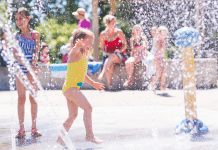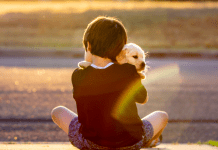I had a moment a few weeks ago where I realized the precariousness of the season of parenting I was in—in This. Exact. Moment. With a five and a half-year-old daughter.
Suddenly (and I’m being a little dramatic here…), it felt like so much was at stake . . . with MY parenting skills.
This isn’t a bad thing. And I don’t think I’m a bad parent by any means. I feel like been doing pretty good up to this point, don’t get me wrong. But when people say kids should come with manuals, I often find myself silently nodding in agreement. Because, yeah, they totally should. They don’t, of course, because unlike the IKEA furniture, no two are the same so a manual truthfully would be sort of useless. Sure, parenting advice gets thrown at us from every angle, and often in contradictory, and not always helpful, ways, but a manual . . . yeah, nope!
Nevertheless, I was thinking a couple weeks ago, after some quiet contemplation (yes, this can happen!), and I realized after cobbling together a bunch of the “best” advice I had gotten, there are things that if I do them even half-right, in this moment, mindful parenting tips will not only make my life as a mother easier, it will actually help my daughter experience my parenting more smoothly.
That sounds weird, doesn’t it? Help her experience my parenting more smoothly? But hear me out.
What I mean is this: I don’t pretend to be a perfect parent who knows it all and never makes mistakes. But sometimes, those mistakes have a bigger impact on my kiddo that I intend. And so, if I can make fewer of them, less often, then I can mitigate some of the challenging experiences we both have: think things like, raising my voice when asking her to get dressed one million times, or threatening to throw away toys that continue to go un-picked up. You know, just the basic, every-day situations.
So, my personal ah-ha moments around transition from the “she needs me for everything” to the “I have to breathe through this chaos” to support her growing and learning as a child and my growing and learning as a parent include:
Her messes are not made to intentionally drive me crazy.
I should know this. But sometimes when I’m trying to juggle keeping the house clean, healthy(ish) meals ready for the family, working full time, seeing one more pile of toys sprout up between dinner and bath time makes me cringe! Here’s the thing too – she IS old enough to pick up her toys, to pick up after herself. And she can do it. No, she may not do it exactly how I would do it, but that’s not the point really. The point is, I’m teaching her to be responsible, and a contributing member of our household. But, I do have to “teach” her how to do that.
What I learned though was that she is still young enough to need some coaching and reminders in this category. When I say “pick up your toys” — that’s not specific enough. Which often results in her a) picking up nothing b) picking up one toy c) getting more toys out or d) any of the above with a little attitude or a deluge of tears. However, when I break it down for her, and am very specific, she’s not only compliant, she’s happily compliant.
- Take this pile of toys and put them in that blue bin.
- When I come back (from folding laundry), I’ll help you find what’s next to put away.
- Ok, put those books over on that shelf.
- Where do we put the Legos? Yes, in that white bin, great, let’s do that next!
If I have time, I certainly can and will help, but as I have shared with her, these are her toys to take care of…vand again, with this coaching and direct instruction, 9 times out of 10, pick up time is happening faster and without any kiddo-is-overwhelmed tears!
Spilled milk really is just spilled milk.
I know I’m not the only one who has overreacted when a glass of milk spills or the goldfish crackers “jump” out of the snack dish. I’ll admit, I’ve lost my cool when things like this happen. It’s because usually I am already late, or trying to do something else and then, let’s be honest, the spill happens and I’m upset because it’s one. more. thing. I have to pick up. But here’s the kicker. It literally is JUST spilled milk (or water, or goldfish, or marbles or whatever…).
It’s NOT the end of the world.
It’s not even close to it.
So when I react that way, it MAKES it a bigger deal than it needs to be. And what happens then? Well, the kiddo either gets emotional herself, either crying or angry too. Why? Because based on my response, all she knows is that I’m upset. And even though what I’m really annoyed with is the stuff on the floor, that I have to clean up, she feels it’s directed at her and that feels… personal.
I’m not saying it’s never OK for me get upset and feel frustrated when situations like this occur. But HOW I react gives the meaning to the thing I’m reacting to. In fact, flipping it around and thinking of how I can “respond” to a situation versus “react” was a helpful way to shift my mindset. By responding, instead of reacting, what I say, and how I say it, also changes how she acts and feels in that moment. Responding to the spilled milk allows me – and her – to share our emotions and feelings about the situation, without guilt or blame. I can share my frustration with the spilled milk, can engage her with how she’s feeling, offer her a napkin, and clean it up together, reminding her that this is why she needs to always walk slowly with a full glass.
For more on the concepts of reaction and responding, check out Licensed Family Therapist Nicole Schwarz’s post here: https://imperfectfamilies.com/do-you-react-or-respond-to-your-kids/
Just because I’ve never seen her do it before doesn’t mean she can’t do it now.
The first time she wanted to cut something with scissors I was like – um, nope! Not till Kinder, kiddo! But she was certain she could do it, and safely. The first time she wanted to practice with a needle and thread for an art class, I was certain I would have to do it for her so she didn’t poke her fingers. When she wanted to help with the dinner preparation, around the hot stove, my first inclination was NO WAY!
I was wrong in each of these instances, and in many others. I found that by imparting my own fear of her participating in activities with reasonable risks (those under supervision), I was potentially creating an attitude where she would avoid trying new things all together. Just because she had never done these things before did not mean she couldn’t. And besides, if she didn’t get the chance to practice in my “controlled and safe” environment, she might never get the chance (not great) or she might try it by herself in a less safe space (worse) OR she might think that she is not capable of these new things (the worst yet!). After a quick tutorial, she successfully navigated the scissors. She only poked her fingers about 5 times with the needle (and survived with no tears) while making an awesome craft. And, she was a great listener to all the prompts when we were cooking around the stove.
Allowing her to help and to try, with guidance, has created a space for her to continue to try new things, to be OK with making mistakes (like when half the box of noodles didn’t make it in the boiling pot the first time…), and learning how to problem solve and do things for herself.
Each time I told her “no” because I wasn’t sure of her abilities, or didn’t think she was “ready”, I was sending her a signal that I didn’t believe in her. Now, at five, can she take the car out for a drive? Of course not, and she’s not even asking to! But there are moments she asks to try something new and I have learned that helping her through that, instead of shutting it down or doing it for her, is teaching her skills of resiliency, confidence, critical thinking, and trusting in herself. I’m on board with those things any day of the week!
Specific praise is more powerful than loud criticism.
I cannot tell you how many times I have caught myself saying – or wanting go say – “good job” and then cringing afterwards. If there is one thing I have heard time and again, but didn’t realize how hard it would be to actually put into practice because of my own bad behaviors and habits was this little nugget: praising often is less important than praising specifically.
Yes, kids need praise (heck, so do all people!). But, study after study has shown that effective praise is more important than a lot of really vague or placating praise (that’s good, you look so pretty/handsome, good job, you are so smart). This is a hard habit to break because in the moment, if you aren’t practicing different ways of praising your child, if you don’t have some new go-tos handy, the old stand-by responses are what become automatic.
And yet, some of that praise that we lavish on our kids can make them less inclined to try hard, less apt to try new things, or less likely to be self-motivated.
Wow. That’s a LOT of pressure, right? The good news is, it’s not hard to get this one right, once you get the hang of it!
- Instead of saying “good job” to our kiddo, I was specific about what she had done that made me happy: “Thank you so much for helping me pick up the way that you did! It really helps mama a lot when you put all your toys back in the right spot!”
- Instead of telling her that she looked pretty today after picking out her own outfit, I shared what I loved about what she had done and pointed out something on the clothing that caught my attention: “I love how big you are getting that you can pick out your clothes and get dressed all by yourself now! And that dress you picked out, I love all the designs on it – what is your favorite design?”
- Instead of telling her that her painting was “good”, I pick out the parts of it that I liked the most: “Wow, that unicorn is really colorful! I love how you made the hair the same colors of the rainbow!”
- Instead of telling her that she was “nice”, I shared what about the moment was most kind: “I saw how you gave your cousin that car back after he was crying. I think giving him his favorite toy back really made him feel better. Did it feel good to help him feel better?”
In our little universe, keeping all these in mind has helped make our home a little calmer and our family a little more joyful on a more regular basis. Is it perfect? Nope! But it is a work in progress and we are learning a little bit more each and every day.


















